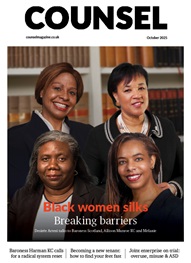*/
The Legal Services Board (“LSB”) will have powers to enter and search the premises of the Bar Council and other legal profession regulators under government proposals. The Ministry of Justice is consulting on the enforcement powers of the LSB when it assumes its role as oversight regulator early next year. Th ese include the power to take over some of the functions of any persistent or seriously failing regulator. Th e LSB will be able to apply for a court warrant to enter and search the regulator’s premises, and retrieve any documents needed to ensure a seamless takeover. Th e consultation asks whether any material should be exempt from search warrants and what a judge should take into account when deciding an application. It ends on 21 January 2010. In a first for the legal profession,
the LSB has appointed an independent consumer panel of eight lay persons to help shape the regulatory framework for lawyers. An early priority for the panel, which meets for the fi rst time at the end of November, will be the issue of referral fees. The experience of panel
membe r s cove r s t r ading standards, housing, business advice, employment law, health care, policing and refugee policy. Dr Dianne Hayter, the former vice-chair of the Financial Services Consumer Panel, who will chair the panel, said it would assess proposals “from the standpoint of users of legal services”. It will publish its advice.
The Legal Services Board (“LSB”) will have powers to enter and search the premises of the Bar Council and other legal profession regulators under government proposals. The Ministry of Justice is consulting on the enforcement powers of the LSB when it assumes its role as oversight regulator early next year. Th ese include the power to take over some of the functions of any persistent or seriously failing regulator. Th e LSB will be able to apply for a court warrant to enter and search the regulator’s premises, and retrieve any documents needed to ensure a seamless takeover. Th e consultation asks whether any material should be exempt from search warrants and what a judge should take into account when deciding an application. It ends on 21 January 2010. In a first for the legal profession,
the LSB has appointed an independent consumer panel of eight lay persons to help shape the regulatory framework for lawyers. An early priority for the panel, which meets for the fi rst time at the end of November, will be the issue of referral fees. The experience of panel
membe r s cove r s t r ading standards, housing, business advice, employment law, health care, policing and refugee policy. Dr Dianne Hayter, the former vice-chair of the Financial Services Consumer Panel, who will chair the panel, said it would assess proposals “from the standpoint of users of legal services”. It will publish its advice.


Justice system requires urgent attention and next steps on the Harman Review
Q&A with Tim Lynch of Jordan Lynch Private Finance
By Marie Law, Director of Toxicology at AlphaBiolabs
By Louise Crush of Westgate Wealth Management
Why Virtual Assistants Can Meet the Legal Profession’s Exacting Standards
Despite increased awareness, why are AI hallucinations continuing to infiltrate court cases at an alarming rate? Matthew Lee investigates
Many disabled barristers face entrenched obstacles to KC appointment – both procedural and systemic, writes Diego F Soto-Miranda
The proscribing of Palestine Action under the Terrorism Act is an assault on the English language and on civil liberties, argues Paul Harris SC, founder of the Bar Human Rights Committee
For over three decades, the Bar Mock Trial Competition has boosted the skills, knowledge and confidence of tens of thousands of state school students – as sixth-form teacher Conor Duffy and Young Citizens’ Akasa Pradhan report
Suzie Miller’s latest play puts the legal system centre stage once more. Will it galvanise change? asks Rehna Azim